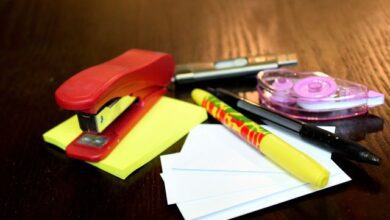4 Tips on Using Literary Devices in Essays

Using figures of speech and other techniques is a sure way to make your writing less dry and more engaging. Unfortunately, there are no strict boundaries when it comes to less serious assignments than research papers or theses. So, when students are given essays, they should be very careful with word choice. And how do you do it? Read on to find out.
Be Moderate
Unless you’re writing an essay in a foreign language where you may have to show the level of your language proficiency, focus on the analysis. If you buy essay online, you expect your writer to make your work informative, right? Remember about it when you’re completing your essay yourself as well.
Even if it’s connected to a literary work, you’re not here to compete with the author in using poetic repetitions and dramatic twists. Concentrate on your main tasks:
- introducing the topic;
- creating a reasonable thesis statement;
- producing a logical flow of ideas;
- coming up with the conclusion and answering the main question.
Your essay shouldn’t be boring and purely academic as if it were a dissertation. Still, flooding the work with figures of speech may not impress your teacher or even make them think you’re doing it to meet the word count. Finally, overusing the techniques makes the essay less informative, and that definitely won’t earn you more points.
Mind the Register
In terms of linguistics, a register is a specific set of words and collocations that should be used in a particular social situation. Roughly saying, writing in an essay “it was pretty cool” is as inappropriate as addressing your professor “dude.”
When analyzing a character’s dramatic feelings and behavior, there’s no need for you to be dramatic. “She’s drowning in tears because her heart was shattered in pieces by such a cruel betrayal” is too empathetic and emotional. Distance yourself from the character even if you can relate to them so much.
Another example of inappropriate wording would be “it was a hell of a hassle” when describing some life challenges in a case study (or even simple literary) essay. Such phrases might work if you’re telling your story in an essay service review and want to emphasize the task’s difficulty. In that case, informal language will be suitable.
On the other hand, academic papers may require evaluating the situation from a philosophical perspective or based on a theory. It goes without saying that a discussion of conflict theory and the word “hassle” are incompatible.
4 Devices to Avoid
Alliteration and Other Repetitions
As said above, showing what a good novelist or poet you could be isn’t your main task when writing most of the essays. Unless you’re asked to use all creative means, stay away from repeating words in an attempt to sound like Ernest Hemingway, John F. Kennedy, or Nelson Mandela. If not used wisely, such repetitions may be considered irrelevant tautology instead of a literary technique.
Onomatopoeia
Imitating a sound or noise for the sake of expressiveness is too much for any academic work. Using words like “bang!” in the middle of an essay is irrelevant and inappropriate. Also, however unfair it may sound, the reader will probably feel prejudice in how good the rest of the text is.
Hyperboles
Exaggerations won’t do good since they either sound too emotional or can be perceived as a sign of poor research. For instance, writing that Edgar Allan Poe published “numerous novels” just because you didn’t feel like checking how much he actually penned is a factual mistake. Even if your teacher likes the whole essay, the confusion will influence your grade.
Irony & Sarcasm
The point of giving students such assignments as essays is to look into their skills and help them develop new ones. Written tasks are proof that you’ve processed the module materials or read a book and a tool to find out how well-rounded you are. So, showing your sense of humor – however good it is – is not the priority.
4 Most Neutral and Appropriate Devices
Amplification
Amplification refers to enriching a rather short and underdeveloped statement by providing more details. The simplest example would be explaining why you called a novel a seminal piece of postmodern literature. To prove it, you may use some facts or mention that this and that approach had never been used before.
Make sure to use this one as it’s the most legitimate way to add more words to your essay without waffling. Also, this device works perfectly to build a justification of your argument (which is a common request in teachers’ feedback). Either it’s a fact that should be supported with a source or specific details that will help you unwrap your thought, use it.
Metaphor
Well, the obvious one. Metaphors are integral to almost every type of writing that is not strictly academic. Just stick to the moderately emotional collocations. Writing something like “Marie had too much weight on her shoulders” sounds rather expressive but not desperate or colloquial. So, your text won’t sound too dry or distract the reader from your idea.
Metonymy
The perk of using metonymy is that quite often, it offers a shorter form to describe a phenomenon, place, institution, or person. For instance, “the Oval Office” vs. “the President of the United States or their administration.” In other cases, it’s a helpful trick to get rid of repetitions when the repeated notion is a part of the topic.
For example, sometimes, you can substitute “New York” with “Empire State,” “American tech industry” with “Silicon Valley,” and “bureaucracy” with “red tape.” If not overused, it’s a good way to show the richness of your vocabulary when it comes to synonyms.
Allusion
This one will definitely show your extensive reading if used properly. References to various works of art and connected phenomena do not only indicate your erudition. It’s also a perfect way to create a so-called literary flashback and make the reader smile or draw remarkable associations and conclusions.
Summing Up
In fiction, literary devices are free to be used in a way the author would like to. However, to stay within the boundaries of the topic and the purpose of completing an essay, mind the tips above. They will help you cut out irrelevant words and improve your style in the end.





